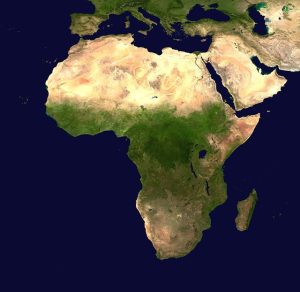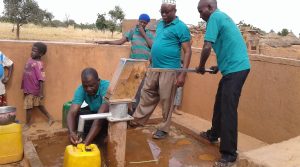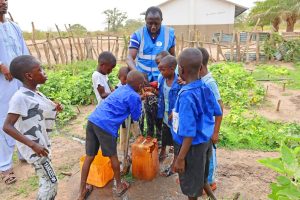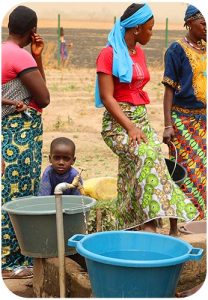Water For Life
Key Features
- The World Health Organization (WHO) reported that over 2.2 billion people lack access to safe drinking water, with Africa and Asia being the most affected by water scarcity.
- Using contaminated or polluted water continues to result in millions of preventable deaths each year from waterborne diseases such as diarrhoea, cholera, and typhoid.
- Humanity First International is actively installing and repairing water facilities, including toilets in schools, solar-powered boreholes, and water filters.
- Clean water and high-quality water filtration improve public health, reduce school dropouts, increase productivity, and boost various industries.
Overview:
Approximately 2.2 billion people in the world lack access to safety managed, sanitised drinking water. That equates to ⅓ people in the world who are unable to drink clean, safe water – a basic human right that so many individuals are unfortunately deprived of. According to the World Health Organisation, 1 million people are estimated to die each year from diarrhoea as a result of drinking unsafe water. But through your support and donations to our programme, hundreds of thousands of lives could be saved annually, and yet millions perish from a problem that has a clear and achievable solution.
Humanity First International aims to solve this issue by installing and repairing water facilities in villages across Africa and Asia, also installing toilets in schools. With many people unable to afford the cost of water installation in their homes, Humanity First International’s aid is centered around low income communities, proving itself invaluable in the continued survival of thousands of people.
What is causing the water crisis in Africa and Asia?
The majority of the water crisis is concentrated in the regions of Africa and Asia. The Middle East and North Africa (MENA) naturally possess hotter and drier climates in comparison to the rest of the world, which significantly exacerbates the issue of water scarcity. This, coupled with limited freshwater supply, means that countries in the Northern African region are experiencing elevated levels of water stress.
When there’s a scarcity of water, the likelihood of using unsafe, contaminated water follows. A report published by the World Health Organization in 2023 states that :
“Microbiologically contaminated drinking water can transmit diseases such as diarrhoea, cholera, dysentery, typhoid, and polio and is estimated to cause approximately 505,000 diarrhoeal deaths each year.”



Why clean water matters: The economic effect of water
Safe and readily available water is important for public health, whether it is used for drinking, domestic use, farming, or sanitation purposes. Therefore, absent or inadequately managed water and sanitation services expose any society to preventable health risks, which immediately affect economic growth.
Water shortages lead to high rates of unemployment and worsen poverty in affected areas. Using polluted or contaminated water will increase death rates among the younger generation. Therefore, to combat the scarcity of water in the African and Asian regions, a sustainable strategy needs to be in place for the efficient use of water for people, food, and the planet. Reliable water supply increases productivity in sectors that employ millions, especially in low-income countries, and decreases school dropouts.
In summary, to break the cycle of poverty, a robust strategy needs to be in place in African and Asian countries facing water scarcity to change the way water is used and managed. Clean water is a golden source for increased agricultural productivity and a boost in industry and manufacturing. Investing in water security is not just about survival; it’s about building stronger, more resilient economies.
How does clean water help save newborns?
Clean, safe water is an absolute necessity for the upbringing of a newborn. Not only for drinking, but for bathing and cooking as well. Every year, an estimated 1.7 billion cases of childhood diarrheal disease are reported globally, and unsafe water is a leading cause – tragically claiming the lives of nearly 525,000 children under five. Newborns are especially vulnerable: in their first fragile weeks of life, exposure to contaminated water can result in deadly infections, such as sepsis, pneumonia, and diarrhoea. In regions lacking access to clean water, mothers are forced to wash their newborns, prepare formula, and clean feeding tools with water that can carry life-threatening bacteria.
The pain of watching a newborn slip away from an illness that could have been prevented with something as basic as clean water is unimaginable. No mother should have to cradle her child for the last time because clean water wasn’t within reach. With your support, we can bring safe water to the world’s most vulnerable – giving every child a fighting chance at life. Please, donate today.

Our Vision


We aim for a world where everyone can access enough clean and safe water to comfortably support themselves, their families, and their wider communities.
How can solar water boreholes and sustainable farming help solve the water crisis?
One of the initiatives we have introduced to countries suffering from the water crisis is solar-powered boreholes. These operate by drilling a narrow, deep shaft into the earth to access underground water sources. This is incredibly important for countries in regions that do not have large supplies of surface-level fresh water, leaving underground sources as the only viable option. The boreholes make use of the hot climate in the region, being powered by solar panels that allow a pump to lift water to the surface, where it can be used for drinking, irrigation or other purposes.
A Better Future Through Water Management and Community Empowerment:
Water management is an often overlooked, yet important structure that is necessary to improve society’s lifestyle. The fact that we are able to drink clean, safe water straight from the tap is something we often take for granted, but it is a result of a water management system that is functional and helpful.
When water is sourced from enhanced and more convenient locations, individuals spend less time and energy gathering it, allowing them to be productive in other activities. A sustainable water management strategy helps preserve the ecosystem by maintaining good water quality and also guarantees the preservation of various natural habitats, animals, and plants relying on water.
Humanity First International’s aim is to introduce this to poorer communities around the world. With water installations, filters, and borehole drilling, more women, children, and families are able to access sanitised water, reducing the spread of waterborne diseases among the community and promoting greater health and hygiene in the area. All these initiatives come together in the hope of raising a new, healthy generation—one that will never need to know the pain and suffering that comes with having no water to drink or bathe with.
Our Impact
Our Mission
Water is a basic human right, and it is Humanity First International’s firm and steadfast commitment to upholding this right that motivates us to keep going in our mission to install as many fresh water sources as possible on the benefits of sanitation and hygiene. We have already made significant progress with this, with our impact being seen in Pakistan and many countries in Africa.
None of this would be possible without your generous donations and support. Your support has touched the lives of thousands across the world. But so many more still wait for that lifeline and pray that one day having clean water will be a reality, you could be the answer of their prayers. With your continued support, we can reach even more families in desperate need.

















